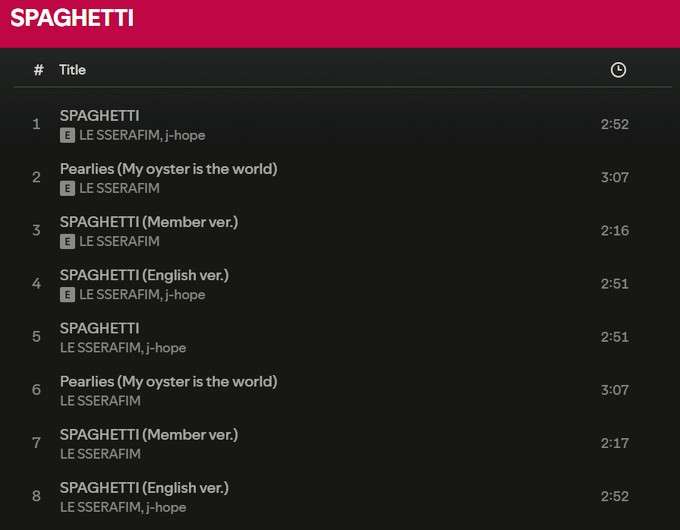LE SSERAFIM’s first single album SPAGHETTI will drop on October 24. Initially, fans were excited. Everyone loved how SOURCE MUSIC was promoting the release. The other day, they announced that BTS’s j-hope will be featured on the title track. A preview of the B-side Pearlies (My oyster is the world) received a lot of praise.
Then SOURCE MUSIC had to ruin the momentum by releasing 20 variants of the physical album.
Why Do We Need Twenty Versions of the Same Single?
The physical editions vary in themes, album covers, collectable items like photocards, photobooks. One version comes with a stress ball that looks like a dog made out of spaghetti. They range from $3 for a single CD to nearly $40 for the Stress Ball version.
Selling 20 variants of a single is ridiculous but it gets better. The digital version of Spotify shows that SPAGHETTI has been split into four different versions. There’s an English version featuring j-hope. A version that only features the members of LE SSERAFIM. Then there’s clean versions of the original, English and member versions of SPAGHETTI. There’s also an explicit and clean version of Pearlies.

It’s technically an eight track release, but we’re only getting two songs? Make it make sense.
Fans have called the whole thing excessive, even exploitative. Threads on Reddit, posts across X and TikTok label HYBE’s decision as “embarrassing.” Just about everyone is calling it a cheap tactic to inflate sales.
They’re not wrong.
How Labels Game the Charts
Releasing multiple versions of an album or song has become more common in recent years. Originally got its start in Korea and Japan, other countries like the U.S. embraced the practice during the COVID-19 pandemic. It’s a cheap way to boost sales or chart rankings by exploiting the obsession of superfans.
Billboard is trying to find ways to filter out all the extra variants. As of March 2025, they only allow four variants of a physical or digital album to count toward their Billboard 200 charts. Anything that exceeds the first four during an album’s life cycle are excluded from eligibility.
Still it hasn’t stopped labels from printing. A 2024 Luminate Data report showed the top ten physical albums in the U.S. averaged over twenty versions combined. Seven vinyls, two cassettes, thirteen CDs. The goal is to flood the charts. After the first week of sales are published, they’ll take a massive dip as the hype fades.
It’s obvious that HYBE is desperate to have LE SSERAFIM chart high on Billboard. The conglomerate doesn’t trust the girls to achieve that feat on their own. They have little trust in FEARNOTS (LE SSERAFIM fans) to come through. Despite the growth the fandom has experienced in the US over the past year. Hell, they don’t even feel having a BTS member feature is a strong enough pull.
Yet it doesn’t matter as long as SPAGHETTI debuts on the Hot 100 right?
The Damage of Overproduction
The industry justifies this practice as “giving fans variety.” Or it’s a survival tactic to encourage sales of physical albums (which pays out more money) in the streaming age (which pays artists very little).
Yet overproduction is starting to cause problems. Pressing plants have reported slowdowns or overstock due to unsold variants from smaller artists. Fans are feeling burned out. The economy is becoming too uncertain to justify spending so much on albums when streaming it is cheaper (for now). Even record store owners have started calling it wasteful. Photos showing thousands of albums littered on Korean streets or filling dumpsters went viral in 2024. Their shelves are lined with editions no one asked for. It’s a hollow victory for everyone involved.
The System Needs Fixing
This won’t stop until entities like Billboard stop rewarding the behavior. Remixes should only count towards a song’s ranking when it’s getting more streams, airplay and downloads than the original. Or the remix is different enough in composition to stand as its own track.
Billboard should also stop counting sales from an artist’s webstore. It’s very common for an artist to release a special, limited version of an album during the first tracking week to inflate sales. Billboard should count variants in a way that makes such a limited impact, there’s no point in selling them.
When every release is engineered for boost numbers, it stops being about music. LE SSERAFIM’s SPAGHETTI is just the latest example of how far that obsession has gone.






